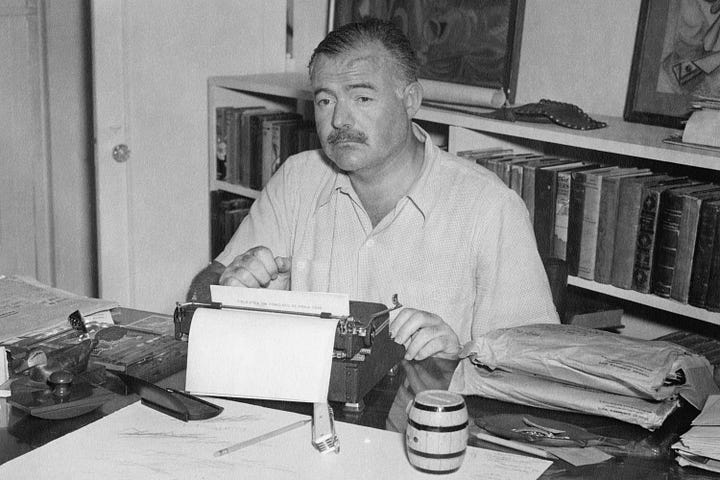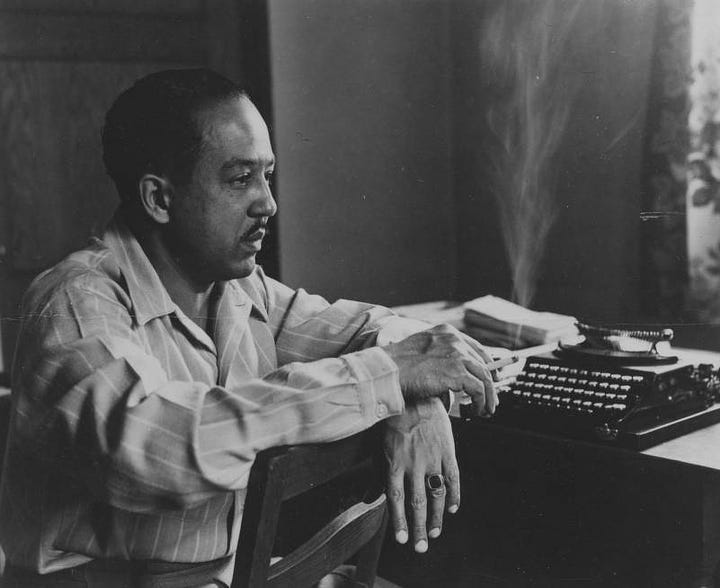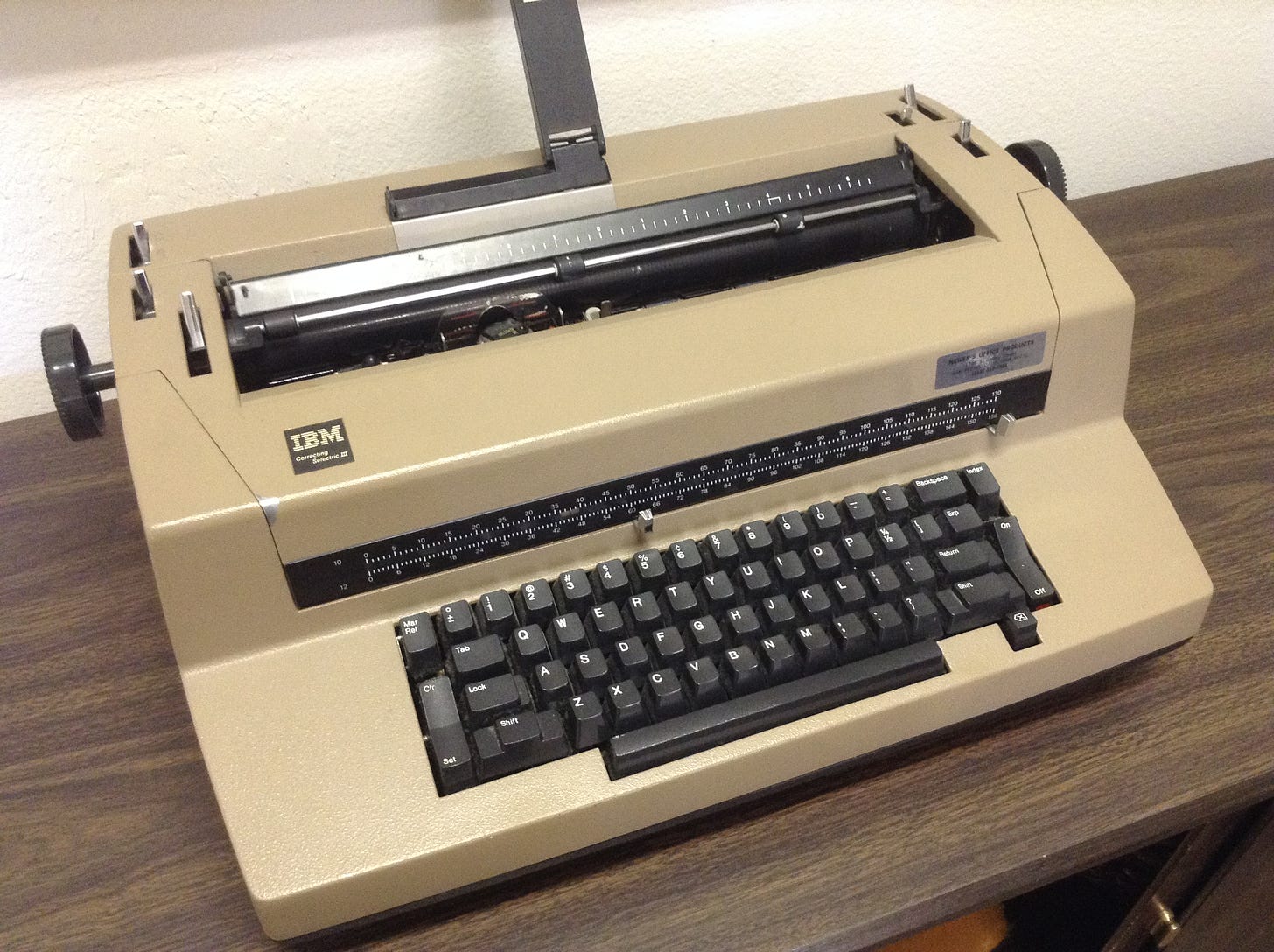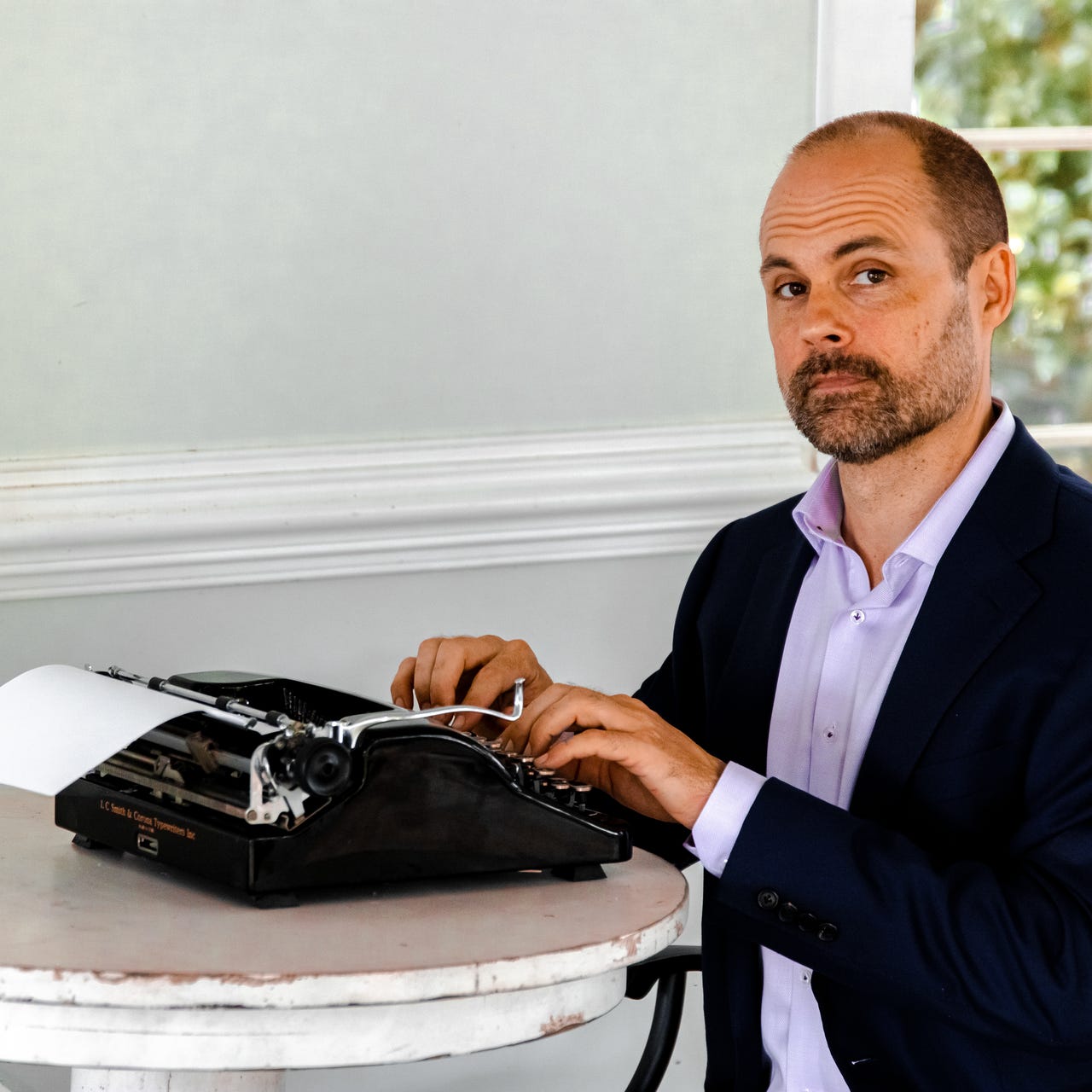Chapter I
In which I briefly describe my childhood longing for a typewriter before becoming the famous gentleman Don Neibauer of Aurora.
I’ve always wanted a typewriter. Being born in 1980, by the time I was old enough to start writing, the most sought-after device was the desktop computer. I remember playing the Oregon Trail as a kid and sitting in typing classes in high school with a piece of cardboard covering my hands. The teacher had a missing finger and would walk up and down the aisles of desks cracking one of his four remaining knuckles.
My dad was a businessman. I remember visiting his office a few times as a kid and seeing IBM typewriters sitting on huge oaken tables in conference rooms. He never let me touch anything, so I could only marvel at these machines from a distance.
As I aged into adulthood, typing technology got sleeker and faster. Macs evolved from clunky boxes to colorful cubes to flat screens detached from their computer cases. In college, I owned a DELL laptop I received as a high school graduation present. I typed thousands of words on that rectangular prism and had many panic attacks when 15-page papers would suddenly disappear because my computer crashed.
I never really identified as a writer growing up. I wrote papers for school. That was what writing was for. I still have terrible handwriting, and the thought of picking up a pen and notepad to do some personal writing never appealed to me. Some time in my mid-20s, after the birth of my first son, I picked up a tattered copy of Whitman’s Leaves of Grass and thought, this is the type of writing I like. I want to be a poet. I started to imagine what it must feel like to be a writer. It felt good.
I started my first blog in 2005. I wanted to post my poetry to the Internet in hopes of connecting with others. I wanted to find a writer’s community that could help me improve my writing. I never took any creative writing courses in college, nor pursued an MFA. I turned to the Internet for feedback. I’d post a poem and wait for a comment.
Crickets.
I continued posting to the ether and received little to no feedback. Three years later, I decided to start blogging with my students. I had formed a boys writing club and wanted my male students to not only see themselves as writers, but have a place to keep their writing that they could access whenever they wanted. Slowly, I was beginning to see myself as a writer and writing teacher. We were developing a shared vision of what a male writer looks like. We could write about farts and poop, but also hard things like love and death; writing our feelings instead of keeping them hidden.
In my mid-30s, I earned my masters and doctoral degrees, further postponing my burgeoning dream of becoming a creative writer (125-page doctoral thesis sucks all of the creativity out of you). It took me a couple of years to feel poetic again.




All this time, I fantasized about getting a typewriter. Honestly, I didn’t believe that typewriters were still available. With the exponential growth of technology, I assumed that typewriters were dead. The closest thing would be a trendy QWERKYWRITERS that plug into your computer and gives you the feel of typing on an old typewriter.
I don’t want to pretend that I’m typing on a typewriter. I want to actually feel like I’m punching out my words onto the paper. I want to train my fingers to push hard for each word. I want to replace the silent clicks of my laptop keyboard with the loud CLACKs of a typewriter. Where would I even begin to search for a typewriter? Do I go to an antique shop or a thrift store? Do people even maintain typewriters anymore?
While scrolling on Substack, I came across
’s excellent stack, dedicated solely to typewriters. Someone who not only loves typewriters more than I do, Budden dedicates his time rescuing them from trash heaps. He founded Classic Typewriter to help people “separate the tools for controlling from the tools for creating.”I see my students struggle with distraction every single day. Technology is no longer a tool for creating, but an infinite pool of distractions. They use their school-issued laptops for gaming and social media. Academic work comes last. Everything comes so fast for my students, that when any gratification is delayed, they think their technology is broken. I want my students to slow down. I want my classroom to be a place of deep thinking. I want my students to take a more active role in themselves.
I’ve already implemented this idea with music; helping my students slow down and become active listeners. I brought in my turntable, speakers, and a small vinyl record collection so that I could give my students practice in listening to an entire album in one sitting. Instead of letting an algorithm tell them what they like (Albums > Algorithms), I’ve helped them understand where the music they like comes from. I’ve been teaching them to examine song lyrics and the political, economic, and socio-cultural factors that influence songs and artists. I want students to understand that music come from times and places in history, not from soundtracks to video games.
This summer begins my quest to help my students reclaim their creative selves through writing. As
says, writing is thinking. How can students think if they don’t slow down and be present in the process? I think that when students are not able to delete, cut and paste, or Google synonyms, it will force them to ignore their inner critic, and push through with their unpolished thoughts. Last year, I piloted John Warner’s The Writer’s Practice with my fifth-grade students. It was a huge success! I’ve seen my students’ skills, knowledge, attitudes, and habits-of-mind grow as writers. I now want to create a place in my classroom where students can take their ideas and bang them out on paper sans WiFi. Unedited. Unadorned. Unadulterated.I just need to find a cool typewriter for my classroom. Let the adventure begin!
Resources
Why Every Writer Needs to Own a Typewriter by Daniel Marleau
A short article that argues for the physical sensation to writing that connects your fingers to your brain instead of using a computer. Marleau also has a short manuscript called Type: A Writer’s Guide to Typewriters.
Why They Can't Write Killing the Five-Paragraph Essay and Other Necessities by John Warner
Warner structures his college-level writing experiences in a way that introduces his students to a way of processing the world through a writer’s practice: the skills, knowledge, attitudes, and habits-of-mind of writers. According to Warner, most students do faux-writing, which has the appearance of writing, but lacks authenticity and the real composition that actual writers do.
Steve Budden’s Substack is filled with resources for anyone interested in finding and using classic typewriters. Listen to Steve discuss why he loves using typewriters.
This teachers brought his grandfather’s typewriter to his classroom. This news report examines the potential return of the mechanical typewriter.






Adrian, this brings back such fond memories of the IBM Selectric 2 my mom bought "used" (okay, I think it "fell off a truck" but that was the only way we could afford it). I borrowed my mom's old typing textbook from her high school days and taught myself. I typed my debate briefs on it; my first jobs in my school district were as a clerk typist. I became an expert at whiting out, cutting and taping. I worked on increasing my speed while sitting in the secretarial pool awaiting a task. When I first got to use a boyfriend's Mac (1984) in college, I would print out my drafts, mark them up, cut them up, tape them together. I still print out drafts to read them and mark them up.
The "Kids React" video was so lovely - their wonder and puzzlement. One caveat for me about using a typewriter to slow things down: I have found that I am a profoundly non-linear writer. I have to be able to write in scattered bits and then organize the chaos. (Next to my keyboard right now, you would see two notebooks, loose leaf paper, sticky notes, and index cards with my jottings.) Handwriting and computing both allow for that ... typing less so.
Thank you for your reflections, and your commitment to examining traditional practices and rebuilding something more meaningful. Reading this post and your linked post about teaching the writing process fired up my brain! Now I'm going to work on my novel -- at 58, I've learned that I am not only a teacher of writing. I AM A WRITER. And the more I practice that craft, the more I learn about the teaching of it.
The clickety-clack-clack of a typewriter-- both the sound and feel (pre-haptics) lured me to write and play at my mother's various typewriters across a period of 10+ years. The medium is indeed the message, the device itself a learning curve, a way to explore how one-dimensional the screen has rendered the writing process: automatic margins & borders; auto-correcting for initial caps, alerting the user to spelling errors, grammatical issues, etc.
We take so much for granted.